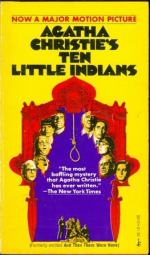|
This section contains 1,995 words (approx. 5 pages at 400 words per page) |

|
Perkins, an Associate Professor of English at Prince George's Community College in Maryland, has published articles on several twentieth-century authors. In this essay she examines how Christie's characterizations in Ten Little Indians provide a harsh vision of human nature.
In British Writers Robin Winks notes that Agatha Christie began writing during a time when detective fiction was a popular form of escapism. He argues that during the twenties, mysteries encouraged readers "to believe that even though their prewar, orderly world had been demolished, there was an ultimate order in human events if only one were astute enough to detect it." Yet during this time period, authors were also influenced by the writings of Sigmund Freud and Charles Darwin. As a result, their characters often revealed deep-seated psychological conflicts that resulted from environmental and biological influences. Christie's early novels reflect her audience's desire to solve puzzles and regain...
|
This section contains 1,995 words (approx. 5 pages at 400 words per page) |

|




